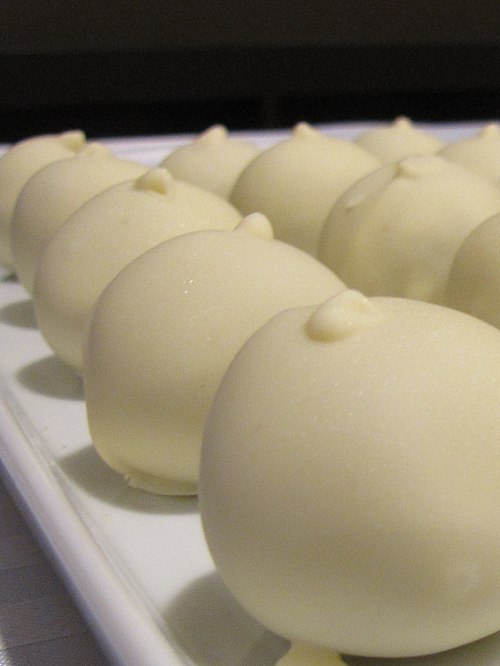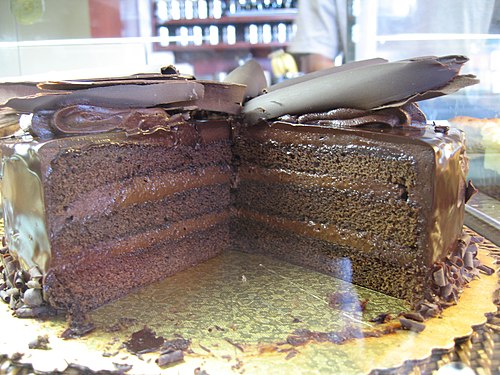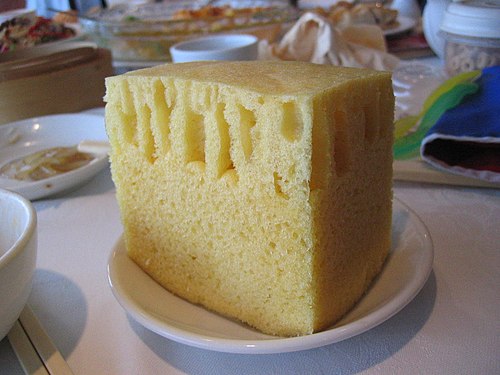Puddingnoun
Any of various dishes, sweet or savoury, prepared by boiling or steaming, or from batter.
Puddingnoun
A type of cake or dessert cooked usually by boiling or steaming.
Puddingnoun
A type of dessert that has a texture similar to custard or mousse but using some kind of starch as the thickening agent.
Puddingnoun
Dessert; the dessert course of a meal.
Puddingnoun
(originally) A sausage made primarily from blood.
Puddingnoun
(slang) An overweight person.
Puddingnoun
(slang) Entrails.
Puddingnoun
(obsolete) Any food or victuals.
Puddingnoun
A piece of good fortune.
Puddingnoun
A species of food of a soft or moderately hard consistence, variously made, but often a compound of flour or meal, with milk and eggs, etc.
Puddingnoun
Anything resembling, or of the softness and consistency of, pudding.
Puddingnoun
An intestine; especially, an intestine stuffed with meat, etc.; a sausage.
Puddingnoun
Any food or victuals.
Puddingnoun
Same as Puddening.
Puddingnoun
any of various soft thick unsweetened baked dishes;
Puddingnoun
(British) the dessert course of a meal (`pud' is used informally)
Puddingnoun
any of various soft sweet desserts thickened usually with flour and baked or boiled or steamed
Pudding
Pudding is a type of food that can be either a dessert or a savory (salty or spicy) dish that is part of the main meal.In the United States and Canada, pudding characteristically denotes a sweet, milk-based dessert similar in consistency to egg-based custards, instant custards or a mousse, often commercially set using cornstarch, gelatin or similar collagen agent such as Jell-O. The modern American usage to denote a specific kind of dessert has evolved over time from the originally almost exclusive use of the term to describe savory dishes, specifically those created using a process similar to that used for sausages, in which meat and other ingredients in mostly liquid form are encased and then steamed or boiled to set the contents. Black (blood) pudding and haggis survive from this tradition.In the United Kingdom and some of the Commonwealth countries, the word pudding is still used to describe both sweet and savory dishes.
Cakenoun
A rich, sweet dessert food, typically made of flour, sugar, and eggs and baked in an oven, and often covered in icing.
Cakenoun
A small mass of baked dough, especially a thin loaf from unleavened dough.
Cakenoun
A thin wafer-shaped mass of fried batter; a griddlecake or pancake.
Cakenoun
A block of any of various dense materials.
Cakenoun
(slang) A trivially easy task or responsibility; from a piece of cake.
Cakenoun
(slang) Money.
Cakenoun
Used to describe the doctrine of having one's cake and eating it too, particularly regarding the UK’s approach to Brexit negotiations.
Cakeverb
(transitive) Coat (something) with a crust of solid material.
Cakeverb
To form into a cake, or mass.
Cakenoun
A small mass of dough baked; especially, a thin loaf from unleavened dough; as, an oatmeal cake; johnnycake.
Cakenoun
A sweetened composition of flour and other ingredients, leavened or unleavened, baked in a loaf or mass of any size or shape.
Cakenoun
A thin wafer-shaped mass of fried batter; a griddlecake or pancake; as buckwheat cakes.
Cakenoun
A mass of matter concreted, congealed, or molded into a solid mass of any form, esp. into a form rather flat than high; as, a cake of soap; an ague cake.
Cakeverb
To form into a cake, or mass.
Cakeverb
To concrete or consolidate into a hard mass, as dough in an oven; to coagulate.
Cakeverb
To cackle as a goose.
Cakenoun
a block of solid substance (such as soap or wax);
Cakenoun
small flat mass of chopped food
Cakenoun
made from or based on a mixture of flour and sugar and eggs
Cakeverb
form a coat over;
Cake
Cake is a form of sweet food made from flour, sugar, and other ingredients, that is usually baked. In their oldest forms, cakes were modifications of bread, but cakes now cover a wide range of preparations that can be simple or elaborate, and that share features with other desserts such as pastries, meringues, custards, and pies.



















































